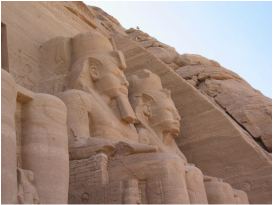Jeremiah Chapter 46 Lesssons from the textGod's Heart In this chapter, God uses the Egyptian's own words against them as mockery. God sees that Egypt will not be able to stand against the coming Babylonian empire and so mocks their arrogant assumption that they will be able to spread their kingdom abroad like flooding waters. In this way, God seems to be laughing at their calamity. Such is outside the normal character of God, right? Actually, God uses sarcasm, mockery, and disdain regularly in the Scriptures. In Judges 10:14, God tells the idolatrous Jewish nation to cry out to the false gods that it has chosen in a tone reminiscent of a lover's scorn. In Psalm 2, the writer states that God will laugh when He overturns the plot of the wicked. Jesus' statement that it is better for someone to be drowned in the sea than to offend His children cannot be construed as a happy, polite comment by the Savior; in fact, He exclaims woes on such sinners (Mt. 18:6-7). How, then, does a loving, compassionate God also display these characteristics? God has a sense of irony. He is able to see the poetic justice in a nation which claims itself as mighty as a flood being overrun by another nation. This points to the fact that God is a lot more complex emotionally than we normally think. God the Father is not some strict judge claiming damnation on sinners. Jesus is not a sheep hugging pastor who would never hurt a fly. The Holy Ghost is not some whisper of the wind who never demonstrates any authority. We, as a society, tend to paint God in one particular image according to what we think God should be like. The Bible, however, displays the full range of God's characteristics and emotions. It reveals a complex God who rejoices, weeps, gets angry, loves mankind, makes difficult decisions, and even hates (see Prov. 6:16-19). When you read verses that sound like sarcasm or scorn, take a moment to stop thinking about God in terms of what you think He should be like, and instead consider how God feels about a certain situation. For instance, put yourself in the situation of being a supreme being watching a foolish nation who has seen your miracles crush their land once already (by the hand of Moses) yet continues to trust in their false gods and their own strength. Wouldn’t you be a little astounded at their arrogance? Mightn’t you shake your head at their foolishness? Trying to understand God's emotional qualities will greatly enhance your fellowship with Him. While we cannot fully understand what He is feeling, our own experiences can help us relate to what He demonstrates of Himself in the Bible. Considering God’s emotions will also help make sense out of the difficult passages where God seems angry or scornful. Through such a study, you see that God is angry at people for what they do, not who they are. God hates the sin in a person’s life and the choices a person makes while, at the same time, still loving that person. This emotional complexity in God's character alleviates the tension between a loving God and a righteous, judging God. Verse by Verse Commentary Despite the splendor of Egypt, their mighty men will run from the battle. Despite the splendor of Egypt, their mighty men will run from the battle. 1-2 This prophecy is given during Jehoiakim’s fourth year. See Jeremiah chapters 25, 36, and 45 for other events for the same year. This is also Nebuchadnezzar’s first year ruling (Jer. 25:1). Noteworthy is that God is decreeing judgment against Egypt before the Jews decide to go into Egypt. This should have caused the Jews to avoid Egypt at all costs, yet their choices as recorded in Jeremiah 42:13-14 and 43:2-7 reveals that they do not believe this prophecy will be fulfilled. 3-12 God mocks the Egyptians. Since they have said that they will “go up, and will cover the earth,” God sarcastically charges them to do so. Their talk has been bold, yet now that Babylon challenges their rule in the region they are “dismayed” and are turning back out of fear. Noteworthy is that God is calling for the Egyptians to display their best. He calls their swift and mighty men to come to the fight. Once there, they will fall in battle. God is saying that for all their plans of conquest (coming up as a flood), they will be squashed by the river Euphrates in judgment for their sins. The Euphrates river is northeast of Israel, cutting through modern day Syria and Iraq. This is as far east as Egypt’s command of the region reaches. As they are beaten back west to their own country, Babylon claims the territories, Israel included. Egypt will not be able to recover from this defeat; no matter how much healing salve they apply, their nation will be beaten down by Babylon. 13-14 The cities listed here are the very same ones the Jews settle in when they flee Israel for fear of the Chaldeans (Jer. 43:7). They did not exhibit the sense to stay away from the places against which God has decreed destruction. 15 Similar to the prophecy to Egypt as a whole, God is saying that even the mighty men of Egypt will be full of fear and defeated by the oncoming army (v. 5). Despite Egypt's grandeur, the Lord is against it, and therefore it will fall. 17-21 As the destruction comes, the people realize that pharaoh's dream of a great empire is vanity. Although Egypt appears well-fed and glorious, its elements will crumble away when God puts it to the test. Those who are hired soldiers, and therefore loyal to Egypt for monetary purposes only, will flee when the invasion comes. Since the destruction is coming from the north, this clearly points to Babylon; verse 26 confirms this (Jer. 4:6-7). 22-26 Egypt thought itself great, but their forest is not comparable to Babylon's innumerable grasshoppers. Whatever might one has, if it is not of the Lord, it will not stand. Noteworthy is that God declares His judgment on the Egyptian gods as well as the people. See Jeremiah 43:12-13. 27-28 Unlike Egypt who has no promise of restoration, Judah is promised to be retrieved from the captivity. God is telling His people that even in the midst of great chaos and turmoil, if they rely on Him, He will see them through. God's people may have to be chastised for their sin, but they will not be utterly destroyed as the Gentiles are. ___________________ Thank you for your faithfulness in studying God’s word. Please comment below to share what you learned from today's lesson.
0 Comments
Leave a Reply. |
Devotional Categories
All
Archives
September 2023
|
|
Join my mailing list!
|
Thank you!You have successfully joined our subscriber list. |
|
© 2024 Melissa Beaty
|
